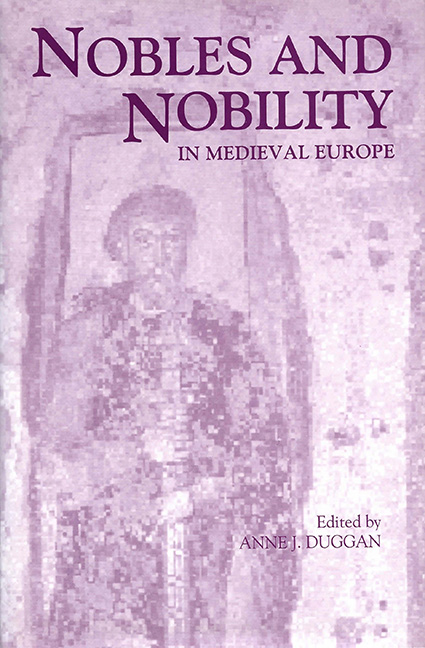 Nobles and Nobility in Medieval Europe
Nobles and Nobility in Medieval Europe Book contents
- Frontmatter
- Contents
- List of Illustrations
- Contributors
- Abbreviations
- Preface
- Dedication
- Introduction: Concepts, Origins, Transformations
- I Early Middle Ages
- II Central Middle Ages
- 7 Princely Nobility in an Age of Ambition (c. 1050–1150)
- 8 Words, Concepts, and Phenomena: Knighthood, Lordship, and the Early Polish Nobility, c. 1100 – c. 1350
- 9 Nobles and Nobility in the Narrative Works of Hartmann von Aue
- 10 A Noble in Politics: Roger Mortimer in the Period of Baronial Reform and Rebellion, 1258–1265
- 11 King Magnus and his Liegemen's ‘Hirdskrå’: A Portrait of the Norwegian Nobility in the 1270s
- III Late Middle Ages
- Index
10 - A Noble in Politics: Roger Mortimer in the Period of Baronial Reform and Rebellion, 1258–1265
from II - Central Middle Ages
Published online by Cambridge University Press: 25 October 2017
- Frontmatter
- Contents
- List of Illustrations
- Contributors
- Abbreviations
- Preface
- Dedication
- Introduction: Concepts, Origins, Transformations
- I Early Middle Ages
- II Central Middle Ages
- 7 Princely Nobility in an Age of Ambition (c. 1050–1150)
- 8 Words, Concepts, and Phenomena: Knighthood, Lordship, and the Early Polish Nobility, c. 1100 – c. 1350
- 9 Nobles and Nobility in the Narrative Works of Hartmann von Aue
- 10 A Noble in Politics: Roger Mortimer in the Period of Baronial Reform and Rebellion, 1258–1265
- 11 King Magnus and his Liegemen's ‘Hirdskrå’: A Portrait of the Norwegian Nobility in the 1270s
- III Late Middle Ages
- Index
Summary
Few nobles played a more decisive part in the downfall of Simon de Montfort than the great Marcher baron Roger Mortimer of Wigmore. After the battle of Lewes in May 1264, Roger's continued resistance did much to undermine the Montfortian regime. After the Lord Edward's escape from Hereford in May 1265, Roger and his wife gave him safety and succour at Wigmore. And at the battle of Evesham in the following August, Roger led one of the royalist lines of battle, the others being commanded by Edward himself and the earl of Gloucester. According to some modern historians, Roger blocked the bridge out of Evesham thus preventing Montfort's escape. According to others, he was stationed with Edward and Gloucester up on the hill above the town and was fully engaged in the main battle. Indeed, in a newly discovered contemporary account, it was Roger himself who struck Montfort the fatal blow. Certainly, after the great earl's body had been mutilated, his head began a horrible journey to Wigmore where it was presented ‘To Dame Maud de Mortimer [Roger's wife] who foully abused it’.
Historians have appreciated that a personal feud between Montfort and the Mortimers underlay the events of these last years. They have been less able to explain Roger's wider conduct between 1258 and 1265. In 1258, after all, he had been ostensibly at least a leading member of ‘the common enterprise’: he was one of the twelve chosen by the barons to draw up the reforms and one of the council of fifteen set up to govern the realm. In 1261 he had resisted the king's overthrow of the Provisions of Oxford and recovery of power, thus in effect standing shoulder to shoulder with Simon de Montfort. Yet in 1263 Roger was conspicuously absent from the faction (although it contained several Marcher barons) which brought Montfort back to England and helped him reassert the Provisions of Oxford. At the end of 1263 he willingly swallowed the bait dangled by the king and plunged into the feud which had its bloody denouement at Evesham. In changing tack between 1258 and 1263 Mortimer was not, of course, alone. Hugh Bigod, the justiciar of 1258, trod a similar path. Such conduct has no single or simple explanation.
- Type
- Chapter
- Information
- Nobles and Nobility in Medieval EuropeConcepts, Origins, Transformations (King's College London 1998), pp. 183 - 204Publisher: Boydell & BrewerPrint publication year: 2000


